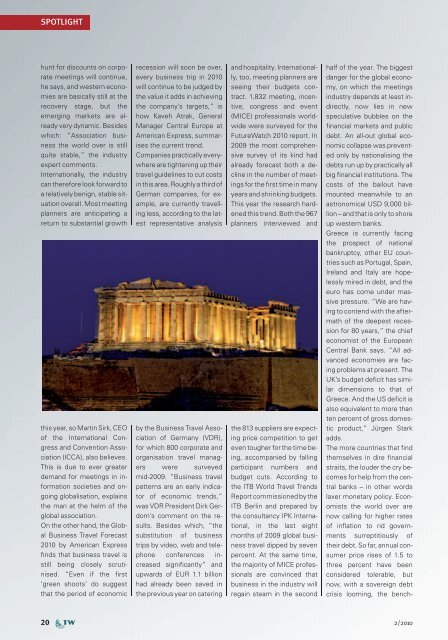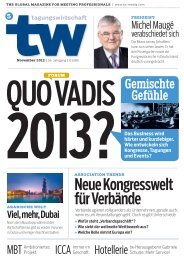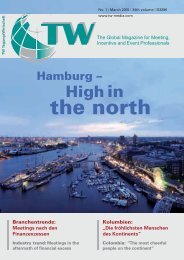financial excesses
financial excesses
financial excesses
- TAGS
- excesses
- www.tw-media.com
Erfolgreiche ePaper selbst erstellen
Machen Sie aus Ihren PDF Publikationen ein blätterbares Flipbook mit unserer einzigartigen Google optimierten e-Paper Software.
SPOTLIGHT<br />
hunt for discounts on corporate<br />
meetings will continue,<br />
he says, and western economies<br />
are basically still at the<br />
recovery stage, but the<br />
emerging markets are already<br />
very dynamic. Besides<br />
which: “Association business<br />
the world over is still<br />
quite stable,” the industry<br />
expert comments.<br />
Internationally, the industry<br />
can therefore look forward to<br />
a relatively benign, stable situation<br />
overall. Most meeting<br />
planners are anticipating a<br />
return to substantial growth<br />
this year, so Martin Sirk, CEO<br />
of the International Congress<br />
and Convention Association<br />
(ICCA), also believes.<br />
This is due to ever greater<br />
demand for meetings in information<br />
societies and ongoing<br />
globalisation, explains<br />
the man at the helm of the<br />
global association.<br />
On the other hand, the Global<br />
Business Travel Forecast<br />
2010 by American Express<br />
finds that business travel is<br />
still being closely scrutinised.<br />
“Even if the first<br />
‘green shoots’ do suggest<br />
that the period of economic<br />
recession will soon be over,<br />
every business trip in 2010<br />
will continue to be judged by<br />
the value it adds in achieving<br />
the company’s targets,” is<br />
how Kaveh Atrak, General<br />
Manager Central Europe at<br />
American Express, summarises<br />
the current trend.<br />
Companies practically everywhere<br />
are tightening up their<br />
travel guidelines to cut costs<br />
in this area. Roughly a third of<br />
German companies, for example,<br />
are currently travelling<br />
less, according to the latest<br />
representative analysis<br />
by the Business Travel Association<br />
of Germany (VDR),<br />
for which 800 corporate and<br />
organisation travel managers<br />
were surveyed<br />
mid-2009. “Business travel<br />
patterns are an early indicator<br />
of economic trends,”<br />
was VDR President Dirk Gerdom’s<br />
comment on the results.<br />
Besides which, “the<br />
substitution of business<br />
trips by video, web and telephone<br />
conferences increased<br />
significantly” and<br />
upwards of EUR 1.1 billion<br />
had already been saved in<br />
the previous year on catering<br />
and hospitality. Internationally,<br />
too, meeting planners are<br />
seeing their budgets contract.<br />
1,832 meeting, incentive,<br />
congress and event<br />
(MICE) professionals worldwide<br />
were surveyed for the<br />
FutureWatch 2010 report. In<br />
2009 the most comprehensive<br />
survey of its kind had<br />
already forecast both a decline<br />
in the number of meetings<br />
for the first time in many<br />
years and shrinking budgets.<br />
This year the research hardened<br />
this trend. Both the 967<br />
planners interviewed and<br />
the 813 suppliers are expecting<br />
price competition to get<br />
even tougher for the time being,<br />
accompanied by falling<br />
participant numbers and<br />
budget cuts. According to<br />
the ITB World Travel Trends<br />
Report commissioned by the<br />
ITB Berlin and prepared by<br />
the consultancy IPK International,<br />
in the last eight<br />
months of 2009 global business<br />
travel dipped by seven<br />
percent. At the same time,<br />
the majority of MICE professionals<br />
are convinced that<br />
business in the industry will<br />
regain steam in the second<br />
half of the year. The biggest<br />
danger for the global economy,<br />
on which the meetings<br />
industry depends at least indirectly,<br />
now lies in new<br />
speculative bubbles on the<br />
<strong>financial</strong> markets and public<br />
debt. An all-out global economic<br />
collapse was prevented<br />
only by nationalising the<br />
debts run up by practically all<br />
big <strong>financial</strong> institutions. The<br />
costs of the bailout have<br />
mounted meanwhile to an<br />
astronomical USD 9,000 billion<br />
– and that is only to shore<br />
up western banks.<br />
Greece is currently facing<br />
the prospect of national<br />
bankruptcy, other EU countries<br />
such as Portugal, Spain,<br />
Ireland and Italy are hopelessly<br />
mired in debt, and the<br />
euro has come under massive<br />
pressure. “We are having<br />
to contend with the aftermath<br />
of the deepest recession<br />
for 80 years,” the chief<br />
economist of the European<br />
Central Bank says. “All advanced<br />
economies are facing<br />
problems at present. The<br />
UK’s budget deficit has similar<br />
dimensions to that of<br />
Greece. And the US deficit is<br />
also equivalent to more than<br />
ten percent of gross domestic<br />
product,” Jürgen Stark<br />
adds.<br />
The more countries that find<br />
themselves in dire <strong>financial</strong><br />
straits, the louder the cry becomes<br />
for help from the central<br />
banks – in other words<br />
laxer monetary policy. Economists<br />
the world over are<br />
now calling for higher rates<br />
of inflation to rid governments<br />
surreptitiously of<br />
their debt. So far, annual consumer<br />
price rises of 1.5 to<br />
three percent have been<br />
considered tolerable, but<br />
now, with a sovereign debt<br />
crisis looming, the bench-<br />
20 2/2010









